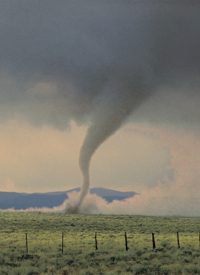
Reporters who go to areas of natural disasters have no motive beyond the story itself. Americans, regardless of race, color, or creed, will gladly contribute a few dollars to help those communities that have suffered from natural disasters. American charity — private giving, as opposed to state-funded social programs — has been a salient feature of a grateful people, thanking God and returning to those who have been hurt some of the blessings He has given us.
This sort of charity can be seen all over our nation every day, especially in those small businesses that are the backbone of our economy and the heart of our nation. Some poor child needs an operation and his parents cannot afford it. When you pay for your breakfast, if you could drop some coins or a dollar or two into this jar, it will help — and we do just that. People on the other side of the world suffer from a tsunami or an earthquake. We do not know them, except that, as Mother Teresa would have reminded us, they are God’s beloved children. Do we aid them? Yes, and we have been doing that for a long, long time.
In fact, when we see real hardship in our city or our state, as when tornadoes come through and tear apart a small town, it is amazing just how quickly churches will dip into their budgets to help folks a hundred miles away or how many Americans will open their homes to those who suddenly do not have a home. Our instinct, our very American instinct, is to help our neighbors. This is not the result of any social lecturing by institutional or government bureaucrats. It is the natural consequence of genuine liberty in action. The help is real; it is directed as precisely as a huntsman’s rifle; and it is based upon the deep and serious faith of Americans.
Consider the tornado that just savaged Pulaski, Virginia. Almost as soon as the cyclones passed, help was there — but not government help. Amy Whitaker of the Red Cross in the area said: “We’ve handed out water, food, cleaning supplies, clothes and even hugs.” The collection site was New Life Church of the Nazarene, and Heather Harris, who is coordinating relief stated: “We are trying to combine our efforts, different churches and groups. We’ve got all kinds of donations coming in.” Stephanie Bishop, whose family lost everything in the calamity, said: “It’s been amazing. We are so blessed. We’ve had people coming up to the house all through the day, asking what they could do for us.”
In the same small town, the Samaritan’s Purse gathered volunteers who, as it said: “… can minister in the name of Jesus Christ to more than 300 homeowners who have lost their homes. Volunteers need to bring tarp roofs, operate chainsaws, and clear out debris…. Thank you for being the Hands and Feet of Jesus Christ.” Faith Bible Church began serving breakfast and lunch for all victims of the disaster, as well as all state troopers and emergency responders. The church also set up a collection site for pillows, blankets, food, and related help for the victims. The Pulaski Presbyterian Church offered free lunches to everyone. The Salvation Army set up a food canteen as well.
This is not an American virtue unique to Virginia or the South. At the same time that people of faith were pouring in help to Pulaski, Virginia, the Valley Disaster Relief in Des Moines, Iowa came in with chainsaws and other equipment. This wholly volunteer group works with help of its own: “They said their saws aren’t the only power they pack; they’ve got God.” Dirk Roghair, a member of this group, says: “It’s totally fulfilling helping someone else. We get more out of it than they do. It’s a totally blessed life.”
Do statists ever wonder how, particularly in rural America, folks survive? How, for example, are homes protected from fires? An astounding 71 percent of firefighters in America are volunteer firefighters and emergency responders. These brave people risk their lives for friends, neighbors, and even strangers to save lives, protect property, and put out fires.
So what has happened in Tushka, Oklahoma, the tiny community of 345 people that was just hit by a tornado? The First Baptist Church of Atoka provided shelter for the victims. The Salvation Army began serving meals. No sooner had the news reports began and the twister swirled passed than their fellow countrymen, out of respect for God and not government, began to help.
President Obama made his pitch for bigger government recently by saying, “The America I know is generous and compassionate.” He is partly right: The America that he sneered was bitter and was clinging to guns and to religion is very generous and compassionate. These volunteers are not throwing temper tantrums at the Wisconsin state capital because their benefits will not be allowed to grow exponentially. These volunteers, instead, wait to gather their riches in another place entirely, very far from the President’s Washington and the havens of the elitist media.



